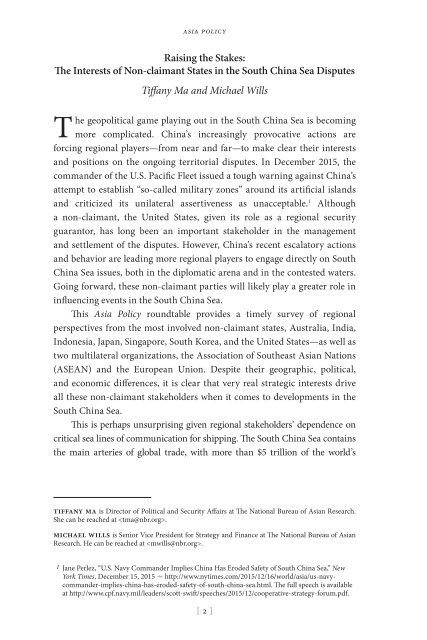Create successful ePaper yourself
Turn your PDF publications into a flip-book with our unique Google optimized e-Paper software.
asia policy<br />
Raising the Stakes:<br />
The Interests of Non-claimant States in the South China Sea Disputes<br />
Tiffany Ma and Michael Wills<br />
The geopolitical game playing out in the South China Sea is becoming<br />
more complicated. China’s increasingly provocative actions are<br />
forcing regional players—from near and far—to make clear their interests<br />
and positions on the ongoing territorial disputes. In December 2015, the<br />
commander of the U.S. Pacific Fleet issued a tough warning against China’s<br />
attempt to establish “so-called military zones” around its artificial islands<br />
and criticized its unilateral assertiveness as unacceptable. 1 Although<br />
a non-claimant, the United States, given its role as a regional security<br />
guarantor, has long been an important stakeholder in the management<br />
and settlement of the disputes. However, China’s recent escalatory actions<br />
and behavior are leading more regional players to engage directly on South<br />
China Sea issues, both in the diplomatic arena and in the contested waters.<br />
Going forward, these non-claimant parties will likely play a greater role in<br />
influencing events in the South China Sea.<br />
This Asia Policy roundtable provides a timely survey of regional<br />
perspectives from the most involved non-claimant states, Australia, India,<br />
Indonesia, Japan, Singapore, South Korea, and the United States—as well as<br />
two multilateral organizations, the Association of Southeast Asian Nations<br />
(ASEAN) and the European Union. Despite their geographic, political,<br />
and economic differences, it is clear that very real strategic interests drive<br />
all these non-claimant stakeholders when it comes to developments in the<br />
South China Sea.<br />
This is perhaps unsurprising given regional stakeholders’ dependence on<br />
critical sea lines of communication for shipping. The South China Sea contains<br />
the main arteries of global trade, with more than $5 trillion of the world’s<br />
tiffany ma is Director of Political and Security Affairs at The National Bureau of Asian Research.<br />
She can be reached at .<br />
michael wills is Senior Vice President for Strategy and Finance at The National Bureau of Asian<br />
Research. He can be reached at .<br />
1 Jane Perlez, “U.S. Navy Commander Implies China Has Eroded Safety of South China Sea,” New<br />
York Times, December 15, 2015 u http://www.nytimes.com/2015/12/16/world/asia/us-navycommander-implies-china-has-eroded-safety-of-south-china-sea.html.<br />
The full speech is available<br />
at http://www.cpf.navy.mil/leaders/scott-swift/speeches/2015/12/cooperative-strategy-forum.pdf.<br />
[ 2 ]


